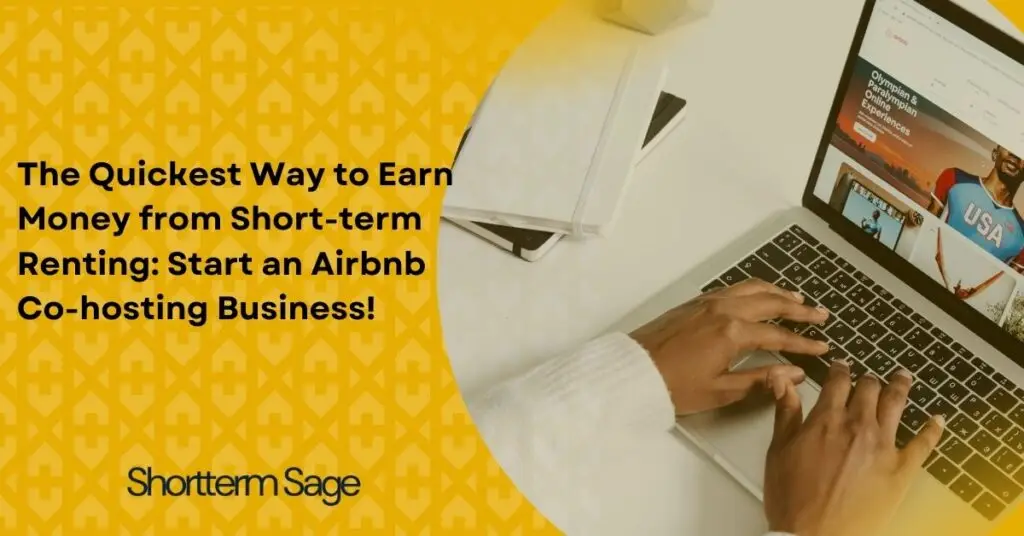
Starting an Airbnb co-hosting business is probably the best way to get into the short-term rental space without having to own any property. Not only that. You can also do it without investing any money, nor incurring legal risks.
Lots of hosts who’ve made huge money on Airbnb got started by co-hosting other people’s properties. They’ve built a successful business co-hosting one unit after another, eventually getting to 6 figures a year.
If you don’t already know, Airbnb co-hosting is when you help the owner or primary host of an Airbnb property with the routine operations of the business. Your goal is to let them relax while you do much of the sweating, all the while maintaining or growing their revenues.
In exchange for letting them step back and not having to do anything in the business, you can then take a percentage of the revenue for managing their property.
So essentially, you’re doing all the day-to-day tasks for them. The difference between Airbnb co-hosting and full-on property management is that co-hosts don’t usually get involved in the financial and legal aspects of the business.
Those include handling insurance-related claims, paying tax obligations, and viewing payout transaction details.
So you can kind of think of yourself as a virtual assistant for a homeowner when you are a co-host.
But the great thing about co-hosting is that you can start making money ASAP – or as soon as you get your first paycheck. Unlike if you go into rental arbitrage, turnkey investing, or the buy-rehab-rent-refinance-and-repeat method, you’d have to wait a while to start profiting from your work.
Because with those strategies, and depending on the type of property you’re hosting, its occupancy levels, and the supply and demand in your area, it could be anywhere from several months to several years before you can recoup your capital and start enjoying your profits.
So with co-hosting, not only can you get a quick return on your sweat equity, but it’s also a lot more scalable. Once you learn the ropes of managing the daily operations of one unit smoothly, it’s easy to co-host another one, then another, and another. Until you eventually find the number that’s manageable for you to be able to leave your primary job and just do Airbnb co-hosting fulltime.
By then you should be able to run things all by yourself – with the help of other contractors who cover the odds and ends. So much so that you can start a full-time, legit, bona fide property management business of your own.
Here’s how you can launch your Airbnb Co-hosting career in 6 easy steps.
First of all, the very least you can do is store up knowledge of how short-term rentals work. Because why would anyone let you into their business if you don’t know anything about running it, right?
So learn the fundamental processes in the business, which includes managing a booking calendar, communicating with guests, and overseeing cleaning and turnovers.
Of course, you won’t need to do all those things yourself. Many primary hosts who run several properties delegate certain tasks or employ local contractors to do them. So if you co-host, you’ll likely be asked to oversee them yourself or you might have to hire others to do them.
But the important thing is, you know the ins and outs of those procedures. You also need to be aware of common and potential problems, and familiarize yourself with the ways they can be resolved and avoided.
There are tons of material out there to help you learn these things: blog posts, YouTube videos, podcasts, online courses. You don’t need to go to college or get a certificate to learn to co-host.
Read also: Co-hosting on Airbnb: Can You Do it Without Prior Hosting Experience?
You can also decide to register your business by forming an LLC which typically costs $200, depending on the state you operate. You can do this later, if and when you decide to do co-hosting full-time. Or you can do this as soon as you start marketing your services.
It’s important to prepare a “credibility packet.” This is where you get business cards and flyers printed so you have something to leave behind for potential clients to reach you.
It’s a good idea to include a detailed list of the services that you offer. You can do a tiered pricing structure where you charge only a certain amount for just guest messaging, and charge higher if the client wants you to also coordinate the turnovers.
Once you know the basics oft short-term renting, it’s time to look for clients. And there are many ways to do it.
First, you can look for people already hosting on Airbnb and other vacation rental platforms. If you can find ones you already know, that would be great. Friends, relatives, neighbors, coworkers, or former classmates.
There’s a higher chance they can either hire you or refer you to somebody else because they already know you. They know your capabilities, like you, and trust you. Reach out to them and find out their needs and challenges.
Many hosts, no matter how long they’ve been renting on Airbnb, still have pain points here and there. It may be that some of their properties aren’t making enough money. They may have a hard time dealing with guest complaints. Or they may be feeling overwhelmed by the stress of managing calendars and scheduling turnovers.
Once you know their problems, you can think of solutions. Then you can craft a proposal that will help solve those problems and get them to hire you.
Knowing the type of property they own, the market they’re in, and the type of guests they’re trying to attract helps a lot, too.
You don’t have to cater to just short-term rental property owners, either. There are long-term landlords who want to shift to short-term as well, but don’t know how.
And there are folks who own second homes and investment properties that are thinking of leasing their space, too. Those are people you can certainly help.
Drive around your neighborhood. Or go to sites like the MLS, Trulia, and Zillow to find condos and apartments for rent. Call the owners, chat with the landlords, and see if they need help getting their spaces rented.
The next thing to do is go on online co-hosting marketplaces like CohostClub and CohostMarket. You can create a profile to let others know about your services.
Or you can join vacation rental forums to get some leads. AirHosts is a forum dedicated solely to hosts and property managers.
BiggerPockets has one for property owners and investors – many of whom just want to invest in properties but aren’t keen on managing them themselves. Some of them may be looking for help with hosting their properties.
Facebook Groups is another place to find clients. Type up the words “Airbnb co-host”, “Airbnb hosts” or “Airbnb property manager” in the search bar, plus the name of the town or city you want to cohost in. You’ll find different pages where property owners and managers congregate. You’ll likely find people looking for help there.
Of course, don’t forget about social media. Let your network know that you co-host short-term rentals. It’ll create awareness about what you do and what co-hosting is, and potentially lead to referrals.
Lastly, check out Meetups.com. Type in Airbnb and your target city, and you’ll find all kinds of meetups for Airbnb investors and real estate agents. You can network with them and build relationships, letting them know of your services.
Co-hosting is like a business partnership. Once you find a client willing to hire your services, it’s important that you sit down, write out all the duties and responsibilities you’ve decided to shoulder, and agree on the terms and conditions.
Make sure it’s clear who’s going to pay for the utilities, cable, and streaming services, and who’ll be responsible in case of break-downs and damages.
Determine what costs you may be reimbursed for such as gas, coffee refills, toiletries, and parking fees. Note how the refund will be processed. And don’t forget to save receipts! Your host can’t pay you back for something you can’t show.
You and the owner or primary host should have all these expectations on paper.

Now you may be wondering, How much do Airbnb co-hosts make? Your Airbnb co-host salary will depend entirely on you – what you’re willing to do and what you really can do. It’ll depend on your skills, knowledge, diligence, and any bit of experience you have.
Typically, co-hosts charge anywhere from 10 to 25 percent of the gross revenue collected on the nightly rate.
If you’re just starting out, with zero experience, you’ll probably have to do with just 10 percent. As you learn the ropes, do more tasks, and master the day-to-day duties, then you can start charging 20 percent or more.
You can choose to do a minimum 3-month-long contract and after that, decide to transition to a month-to-month agreement. And if you or the owner want to cancel it at any time, that’s fine. Just include a provision for a 30-day written notice so the owner can find a replacement ahead of time, and you can plan your exit strategy as well.
Whether or not your clients are experienced Airbnb hosts and have a team of service providers already, you’ll still need a crew of your own.
You’ll likely need a few people to help you in case the need arises. And it will arise, as you take on more listings. You’ll need cleaners, handymen, virtual assistants (VA), and even designers and photographers.
Start sourcing talent from your friends, neighbors, and people you trust. Go on Yelp or Handy, look for contractors, and get different bids. Go on online job boards to find remote VAs.
It’s always good to have clearly defined goals and objectives for your business. Ultimately, these will drive what you do, the market you attract, the clients you work with, the revenues you make, and the direction your business will take. It’ll also determine the identity of your company.
Then you can look for co-hosting clients that fit in with those objectives.
When you have a name and brand for your business, satisfied guests will tend to look for that brand. For example, if you co-host a property in another city, guests will look for the same experience they got from your first property. So it’s important to deliver the same quality of service with each property you host.
If that means self-check-in, then do self-check-in for each and every property. If that means coffee, or wine as a welcome gift, make sure it’s available each time. The experience you provide shouldn’t change.
Read also: Don’t Start an Airbnb Business Without Answering These 8 Questions First
Our reviews are made by a team of experts before being written and come from real-world experience. Read our editorial process here.
Some of the links in this article may be affiliate links, which can provide compensation to us at no cost to you if you decide to purchase a paid plan. These are products we’ve personally used and stand behind. This site is not intended to provide financial advice. You can read our affiliate disclosure in our privacy policy.
About the author:
This website is operated and maintained by Short Term Sage LLC. Use of the website is governed by its Terms Of Service and Privacy Policy.
Short Term Sage LLC may link to content or refer to content and/or services created by or provided by third parties that are not affiliated with Short Term Sage LLC. Short Term Sage LLC is not responsible for such content and does not endorse or approve it.
We use cookies to help improve, promote and protect our services. By continuing to use this site, you agree to our privacy policy and terms of use.